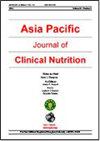Prevalence and risk for malnutrition in older Thai people: A systematic review and meta-analysis.
IF 1.3
4区 医学
Q4 NUTRITION & DIETETICS
Asia Pacific journal of clinical nutrition
Pub Date : 2022-03-01
DOI:10.6133/apjcn.202203_31(1).0014
引用次数: 4
Abstract
BACKGROUND AND OBJECTIVES Malnutrition is potentially preventable in older people, but with varied reported prevalence. We assessed its prevalence, assessment methods, and risk factors in older Thai people. METHODS AND STUDY DESIGN Studies published from January 1, 2000, to September 30, 2020 were searched in Medline, EMBASE, Google Scholar, and local databases. A random-effects model was used to calculate pooled prevalence with subgroups analysis (setting of the patient, region). Forest plots displayed sensitivity and specificity for all nutritional screening tools validated against Mini Nutritional Assessment (MNA) with tests for heterogeneity. Publication bias was tested by funnel plot and Egger's test. RESULTS 71 studies (total 23,788 subjects) were included where mean age was 65.5 to 78.3 years. The pooled prevalences of malnutrition were 10.4%, 6.1%, and 5.7% by body mass index (BMI), MNA, and MNA-Short Form (MNA-SF), respectively. At-risk of malnutrition prevalence was 42.6% using the MNA and 37.8% using the MNA-SF. The pooled prevalence of malnutrition by BMI <18.5 kg/m2 was 10.4% (95% CI 8.7-12.4). The pooled prevalence of malnutrition based on MNA was 6.1% (95% CI 3.8-9.4). It was highest among hospitalized patients and lowest in community-dwelling elders by both measures. Factors associated with malnutrition were female sex, advanced age, low education, living alone, living in rural areas, comorbidities, eating problems, and geriatric conditions. CONCLUSIONS The pooled prevalence of elder malnutrition was 6-10%, depending on assessment method and study setting. Hospitalized older people were at increased risk of malnutrition. It might be ameliorated through community directed food systems.泰国老年人营养不良的患病率和风险:一项系统回顾和荟萃分析。
背景和目的营养不良在老年人中是可以预防的,但报告的患病率各不相同。我们评估了其在泰国老年人中的患病率、评估方法和风险因素。方法和研究设计在Medline、EMBASE、Google Scholar和当地数据库中搜索2000年1月1日至2020年9月30日发表的研究。随机效应模型用于通过亚组分析(患者的设置、区域)计算合并患病率。森林图显示了所有营养筛选工具的敏感性和特异性,这些工具通过异质性测试与迷你营养评估(MNA)进行了验证。发表偏倚通过漏斗图和艾格检验进行检验。结果纳入了71项研究(共23788名受试者),平均年龄为65.5至78.3岁。按体重指数(BMI)、MNA和MNA简式(MNA-SF)计算,营养不良的综合患病率分别为10.4%、6.1%和5.7%。使用MNA的营养不良患病率为42.6%,使用MNA-SF的患病率为37.8%。BMI<18.5kg/m2的营养不良合并患病率为10.4%(95%CI 8.7-12.4)。基于MNA的营养不良综合患病率为6.1%(95%CI3.8-9.4)。通过这两项指标,住院患者的营养不良患病率最高,社区老年人的营养不良发病率最低。与营养不良相关的因素包括女性、高龄、低教育程度、独居、农村生活、合并症、饮食问题和老年疾病。结论根据评估方法和研究环境,老年人营养不良的合并患病率为6-10%。住院的老年人营养不良的风险增加。它可能会通过社区指导的食品系统得到改善。
本文章由计算机程序翻译,如有差异,请以英文原文为准。
求助全文
约1分钟内获得全文
求助全文
来源期刊
CiteScore
2.50
自引率
7.70%
发文量
58
审稿时长
6-12 weeks
期刊介绍:
The aims of the Asia Pacific Journal of Clinical Nutrition
(APJCN) are to publish high quality clinical nutrition relevant research findings which can build the capacity of
clinical nutritionists in the region and enhance the practice of human nutrition and related disciplines for health
promotion and disease prevention. APJCN will publish
original research reports, reviews, short communications
and case reports. News, book reviews and other items will
also be included. The acceptance criteria for all papers are
the quality and originality of the research and its significance to our readership. Except where otherwise stated,
manuscripts are peer-reviewed by at least two anonymous
reviewers and the Editor. The Editorial Board reserves the
right to refuse any material for publication and advises
that authors should retain copies of submitted manuscripts
and correspondence as material cannot be returned. Final
acceptance or rejection rests with the Editorial Board

 求助内容:
求助内容: 应助结果提醒方式:
应助结果提醒方式:


